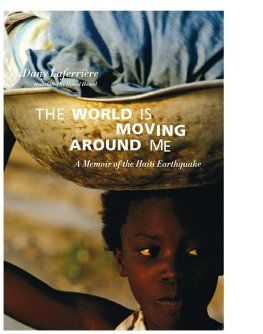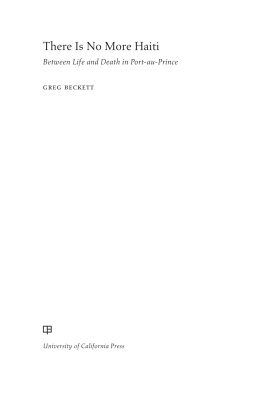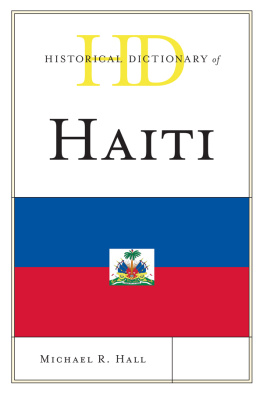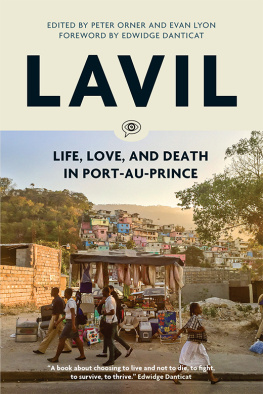Dimitry Elias Leger
God Loves Haiti
To my wife, Katarina, and our children, Sidney and Nina.
And the nine million survivors of the January 2010 earthquake in Haiti, including my cousins Josette, Fabienne, Reginald, Philippe, Alain, and Gilbert Lger, and their spouses and children.
After that hot gospeller had leveled all but the
Churched sky,
I wrote the tale by tallow of a citys death by fire;
Under a candles eye, that smoked in tears, I
Wanted to tell, in more than wax, of faiths that were snapped like wire,
All day I walked abroad among the rubbled tales,
Shocked at each wall that stood on the street like a liar;
Loud was the bird-rocked sky, and all the clouds were bales
Torn open by looting, and white, in spite of the fire.
By the smoking sea, where Christ walked, I asked, why
Should a man wax tears, when his wooden world fails?
In town, leaves were paper, but the hills were a flock of faiths;
To a boy who walked all day, each leaf was a green breath
Rebuilding a love I thought was dead as nails
Blessing the death and the baptism by fire.
Derek Walcott, A Citys Death by Fire
When it brushes past, Death leaves us in a frenetic state that pushes us to defy the gods.
Dany Laferrire, from his Haitian earthquake memoir, Tout bouge autour de moi
On a five-meter-high pile of gravel where a blink of an eye ago stood a grand airport and a dozen blue-helmeted soldiers having a smoke and a laugh under a cooling shade away from the blistering Caribbean sun, a young woman in a torn dress and one broken high-heeled shoe sat on her elbows and cried. The world had gone white on her in a very unexpected and violent way. Not the tanned white of the skin tones of the Tuscan neighbors she expected to be sipping coffee with after a transatlantic flight. Her entire world had gone white white, and she was still in Port-au-Prince, her eternally godforsaken hometown, confused as hell. A dense cumulus of dust shrouded her eyes. She felt something had gone irrevocably wrong in the universe. Her carefully laid plan to reach a dream so dear to her that shed sold her soul for it seemed stillborn. She felt like the smallest person in the world. Microscopic. Unmoored and irretrievably lost. She tried to scan the horizon and noticed what was left of the American jet from whose steps she had been rudely ejected a half-minute ago. The jet sat on its back. Wheels-up in the literal sense of the term. She knew that even the finest jet in the world would have trouble taking off from an upside-down position on a runway composed of rubble and fog. She knew this meant she would be stuck in Haiti for a while longer. On a level that shock prevented her from articulating yet, she would try to find honor in this state of affairs, or at least come to see it as an opportunity to restore honor lost. First her head would have to stop throbbing and her ears would have to stop ringing. The goudou-goudou sound must have done this. The rumble would not go away. She felt submerged in it, swallowed up by it. She felt like she was in the belly of a whale, and she was struggling to peer out into the world or find solid footing in its swaying and sloshing. The whales intestines and pounding heart and lungs pounded hers. Was, was that an earthquake? Only a giant earthquake could shake the ground hard enough to pluck her from an airplanes steps and toss her a hundred meters backward, like a feather, while also taking the airplane and flipping it on its back, like a toy. Did an earthquake destroy the airport and, and, anything else? My God. But she had studied her countrys history in school. As best she could tell there was no record of the earths randomly knocking things about. Granted, she had mainly studied Haitis art history, particularly works of a spiritual bent, works meant to inspire, heal, and bring folks closer to God. If an artist never painted or sculpted or wrote poetry about an event of the magnitude of a massive earthquake, and the succor of God, Jesus, angels, and saints, in vain, always in vain, after such a ravaging disaster in Haiti, could an earthquake ever have happened here? There had been deadly floods, famines, diseases, hurricanes, civil wars, and invasions in Haiti. That, she knew. All of these events, and every single death, especially the preventable ones, were gut-wrenching, and most were documented one way or another with the creative tools of the day by each eras painters, singers, and poets, and this despite the countrys considerable illiteracy rate. The artists almost always tried to celebrate the presence of heaven above by making light and preaching courage in the face of the limits of the human spirit and our fortunes here. It was easy for foreigners and the wealthy who felt safe on their perches to laugh at the believers, Natasha often thought. In the end of times wed be proven right. Those who laughed now would cry later. After all, its easier for a rich man blah, blah, blah. My God, am I dead? she thought. Is this hell? Heaven? Could time really have run out on me before Id painted my Sistine Chapel? Before Id made things right with Alain, the man I loved but left for a wealthier man?
Natasha was about to blaspheme. She resisted the impulse. Barely. She sensed, on a primitive level, the scale of the rupture in history that had taken place. It frightened her. Her arms and legs and feet were caked with dust, so were her lips, face, and false eyelashes. With no warning, something had transformed her into a Caribbean version of a lava-caked citizen of Pompeii. And she was not alone. The moans of wounded men and women both inside and outside the airport, which had been faint and distant, grew closer and louder. Jesus! Jesus! Jesus! Jesus! they said. Mon Dieu! they wailed. A pearly bead of cold sweat trickled down Natashas temple.
She decided to get off the pile of rubble. Shed read somewhere that earthquakes were known to generate aftershocks. Who knew how long she had been knocked out? Who knew how long she had before the earth betrayed her trust again? She had to get moving before an aftershock transformed her debris pile from a throne to a coffin. Gingerly, Natasha moved her ass down the pile of cement, cheek by cheek, hand by hand, gripping rock and, once, the face of a dead man whose head, judging from how easily it rolled around, had been separated from his body. Finally, she stood on terra firma, whatever that meant at this point. She took stock. Her right knee bled and her left ankle hurt terribly. She still couldnt see beyond two meters in front of her. Her ears still rang with the pounding roar. Like a misting rain, moans, oh-my-gods, and cries for help floated in the air. The voices glancing touch felt like being pricked by ice. And breathing the heavy air stung Natashas lungs. When would the itch in her throat go away? The first step she took went off OK. The second step butted on something soft and expiring. A man in a pilots uniform with half of his head missing stared up at her. As a child, shed worshiped airplane pilots, as though they were angels, angels who ferried people off her island and into the endless blue sky in hulking metal contraptions that only God had to know how they managed to stay aloft. If these men could foil Haitis gravity, why couldnt I, Lord?
Now an angel lay dead at her feet. Quietly, Natasha Robert began to weep. She walked on. In tears, she whimpered and limped on. Wearing one shoe. Her destination, unknown. She carefully apologized to each prone person on the ground, whether he or she was dead or alive. The ground was hard to see. The fog was still thick. In truth, she didnt want to look too closely at other people yet. Too often, they were broken up. Their bodies were contorted in ways the body wasnt meant to be. After a while, she couldnt tell for how long she had been walking or where she was. Time seemed to have stood still or shifted in a way she found hard to grasp. She may have walked through the airport and out to the street and around the block and back to the tarmac. Besides moaning and crying for help, she could not hear much else. No sounds of cars, radios, or birds chirping.










